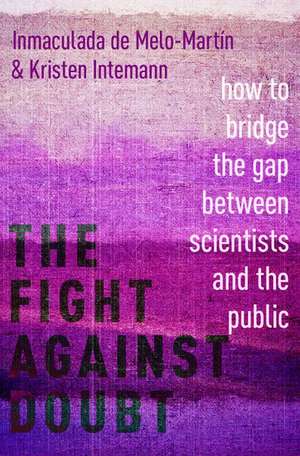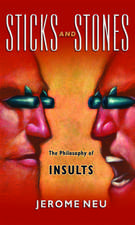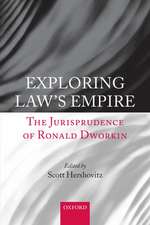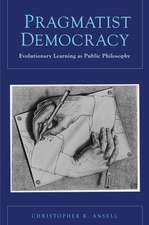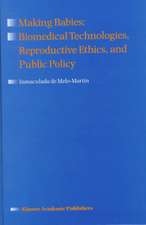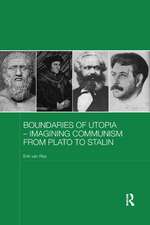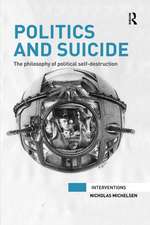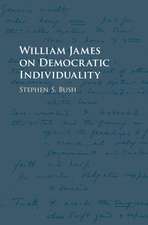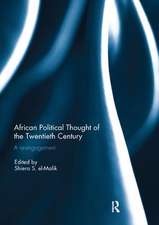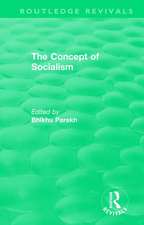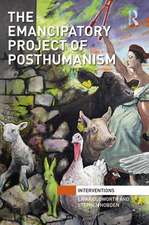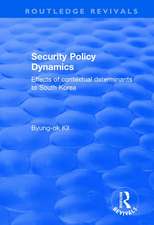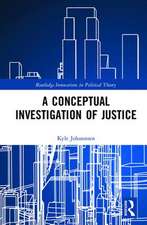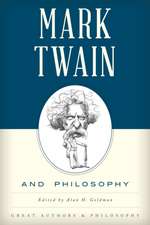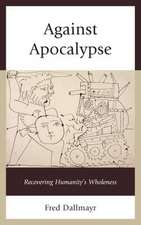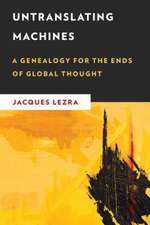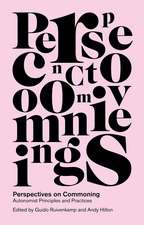The Fight Against Doubt: How to Bridge the Gap Between Scientists and the Public
Autor Inmaculada de Melo-Martín, Kristen Intemannen Limba Engleză Hardback – 16 aug 2018
Preț: 424.07 lei
Nou
Puncte Express: 636
Preț estimativ în valută:
81.16€ • 84.42$ • 66.100£
81.16€ • 84.42$ • 66.100£
Carte disponibilă
Livrare economică 24 martie-07 aprilie
Preluare comenzi: 021 569.72.76
Specificații
ISBN-13: 9780190869229
ISBN-10: 0190869224
Pagini: 232
Dimensiuni: 239 x 163 x 23 mm
Greutate: 0.45 kg
Editura: Oxford University Press
Colecția OUP USA
Locul publicării:New York, United States
ISBN-10: 0190869224
Pagini: 232
Dimensiuni: 239 x 163 x 23 mm
Greutate: 0.45 kg
Editura: Oxford University Press
Colecția OUP USA
Locul publicării:New York, United States
Recenzii
The Fight Against Doubt is a valuable contribution to a topic of major social relevance ... In this book we are reminded anew of the positive value of dissent which has come out of focus in the discussion about NID [normatively inappropriate dissent].
The Fight against Doubt provides a useful description, with excellent detail and rigor, of an impressive number of examples of scientific dissent producing (or related to) some socially harmful consequences. Moreover, the authors clearly present a number of arguments to dismantle some deeply entrenched ideas about scientific dissent.
[an] excellent book ... de Melo-Martin and Intemann have provided an invaluable analysis of the failure of publics to accept the overwhelming consensus of experts and rightly warned us against attaching too much of the blame for this to dissenting voices. They also do a great service in pointing out the dangers, not merely intellectual, of overestimating the role of scientific findings in the formation of policy.
Immaculada de Melo-Martín and Kristen Intemann's The Fight against Doubt provides a clearly written and insightful contribution to this debate, with many interesting examples to help the discussion along.
That de Melo-Martín and Intemann share the values and concerns of many of those engaged in this debate but disagree over the best way to mitigate problematic scientific dissent is an important reason to engage with The Fight Against Doubt. Its focus on a different aspect of the mechanisms at work-the qualities of the "soil," rather than the mere existence of "seeds of doubt"-makes this a valuable book.
a must-read for all who are interested in the health of human communities around the globe.
The authors seek to reframe such discussions to recognize both the contingency of scientific results and the role of conflicting values in assessing consensus. The presentation is careful, fair, and original, free of unnecessary jargon or inflated rhetoric. Researchers and professionals working the boundary between scientific research and public policy will need to consider the views here. Because dissent against prevailing views in science touches on the foundations of scientific inquiry, this could be a useful text in undergraduate courses on the philosophy of science or public policy. Summing up: Highly Recommended
Science is nothing if not probingly critical; in principle no claim, however settled, is exempt. However, there doesn't look to be any bright line marking out scientifically productive from pernicious dissent, and even if there was, shutting down dissent is unlikely to move debate forward on many of the urgent matters we currently face. What's needed, de Melo-Martin and Intemann argue, is a decisive pivot away from debate about dissent. The Fight Against Doubt is a stirring call to take up the challenges of reconfiguring scientific practice so that it warrants public trust, and of bringing to the surface, rather than suppressing, underlying disagreements about moral, political and social values.
The authors analyze socially consequent dissent from scientific judgments, the contexts in which it occurs, its relations with other factors that affect public policies, and the difficulties of defining when it is normatively inappropriate. Their analysis is comprehensive, lucid, nuanced, often original, and accompanied by illuminating examples from research in climate science, medicine, and agriculture. I recommend for all concerned about current threats to the integrity and authority of science.
Intemann and de Melo-Martin acknowledge that commercial and political interests have damaged public trust in science, opening the door for more dissent than is justified. They make positive suggestions for handling this dissent: not by dismissing it as unscientific, but by improving the ethical conduct of science and acknowledging the role that values play in scientific inquiry. The result is a thoughtful set of practical recommendations for improving the interactions between science and society.
The Fight against Doubt provides a useful description, with excellent detail and rigor, of an impressive number of examples of scientific dissent producing (or related to) some socially harmful consequences. Moreover, the authors clearly present a number of arguments to dismantle some deeply entrenched ideas about scientific dissent.
[an] excellent book ... de Melo-Martin and Intemann have provided an invaluable analysis of the failure of publics to accept the overwhelming consensus of experts and rightly warned us against attaching too much of the blame for this to dissenting voices. They also do a great service in pointing out the dangers, not merely intellectual, of overestimating the role of scientific findings in the formation of policy.
Immaculada de Melo-Martín and Kristen Intemann's The Fight against Doubt provides a clearly written and insightful contribution to this debate, with many interesting examples to help the discussion along.
That de Melo-Martín and Intemann share the values and concerns of many of those engaged in this debate but disagree over the best way to mitigate problematic scientific dissent is an important reason to engage with The Fight Against Doubt. Its focus on a different aspect of the mechanisms at work-the qualities of the "soil," rather than the mere existence of "seeds of doubt"-makes this a valuable book.
a must-read for all who are interested in the health of human communities around the globe.
The authors seek to reframe such discussions to recognize both the contingency of scientific results and the role of conflicting values in assessing consensus. The presentation is careful, fair, and original, free of unnecessary jargon or inflated rhetoric. Researchers and professionals working the boundary between scientific research and public policy will need to consider the views here. Because dissent against prevailing views in science touches on the foundations of scientific inquiry, this could be a useful text in undergraduate courses on the philosophy of science or public policy. Summing up: Highly Recommended
Science is nothing if not probingly critical; in principle no claim, however settled, is exempt. However, there doesn't look to be any bright line marking out scientifically productive from pernicious dissent, and even if there was, shutting down dissent is unlikely to move debate forward on many of the urgent matters we currently face. What's needed, de Melo-Martin and Intemann argue, is a decisive pivot away from debate about dissent. The Fight Against Doubt is a stirring call to take up the challenges of reconfiguring scientific practice so that it warrants public trust, and of bringing to the surface, rather than suppressing, underlying disagreements about moral, political and social values.
The authors analyze socially consequent dissent from scientific judgments, the contexts in which it occurs, its relations with other factors that affect public policies, and the difficulties of defining when it is normatively inappropriate. Their analysis is comprehensive, lucid, nuanced, often original, and accompanied by illuminating examples from research in climate science, medicine, and agriculture. I recommend for all concerned about current threats to the integrity and authority of science.
Intemann and de Melo-Martin acknowledge that commercial and political interests have damaged public trust in science, opening the door for more dissent than is justified. They make positive suggestions for handling this dissent: not by dismissing it as unscientific, but by improving the ethical conduct of science and acknowledging the role that values play in scientific inquiry. The result is a thoughtful set of practical recommendations for improving the interactions between science and society.
Notă biografică
Inmaculada de Melo-Martín is professor of Medical Ethics at Weill Cornell Medicine. She holds as PhD in Philosophy and an M.S. in Biology. Her research focuses on ethical and epistemological issues related to biomedical sciences and technologies. She has published extensively on those topics in both philosophy and science journals. She is the author of Rethinking Reprogenetics (OUP, 2017).Kristen Intemann is an Associate Professor of Philosophy in the Department of History & Philosophy at Montana State University. She specializes in philosophy of science, particularly on issues related to values in science, scientific objectivity, and diversity in scientific communities. She has published in a variety of philosophy and science journals including Philosophy of Science, The European Journal of Philosophy of Science, Synthese, EMBO Reports, and FASEB Journal.
